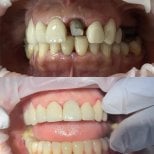Dr. Moises Irazoqui, a periodontist with 900+ procedures completed, uses Swiss-made Straumann implants and offers aesthetic zirconia crowns. At the Teethsavers Dental Clinic near the US border, this package costs around $1,500 and covers the implant, crown, CT diagnostic imaging, and a 4-day stay with transfers. The clinic holds recognition from the Asociación Dental Mexicana for implant excellence, and treatment includes an initial visit with a 3–6 month healing period before final crown placement.


